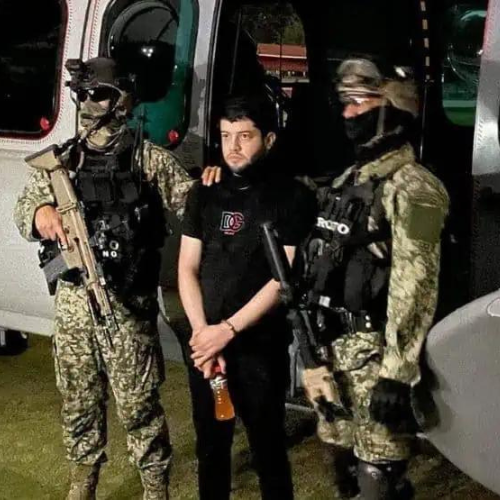“El Nini,” also known as Néstor Isidro Pérez Salas, is a top assassin and Sinaloa Cartel boss who was extradited from Mexico to the United States. Drug importation, homicide, kidnapping, felonies involving firearms, and money laundering are among the several counts El Nini is facing. This well-publicized extradition serves as another evidence of the cooperation between Mexican and American law enforcement in the fight against drug trafficking and organized crime.
Background
A significant amount of the fentanyl that is pouring into the United States is coming from the Sinaloa Cartel, one of the most potent and dangerous drug trafficking groups in Mexico. One of the main causes of death for Americans between the ages of 18 and 49 is fentanyl, a synthetic opioid that is more than 50 times stronger than heroin. Notably, the sons of the notorious Joaquin “El Chapo” Guzmán—collectively referred to as the “Chapitos”—have been leading the cartel.
A violent organization known as the “Ninis” was commanded by El Nini, a 32-year-old Mexican native who held a key leadership position in the Chapitos security squad. The name of this group comes from a colloquial expression in Mexico that describes young individuals who don’t go to school or job. The Ninis, led by Pérez Salas, were tasked with defending the Chapitos’ activities and employing severe violence against adversaries and police enforcement.
Allegations
Two indictments contain the charges against El Nini. Charges of importing cocaine and methamphetamine, possessing illegal firearms, and plotting to obstruct justice by murder are included in the first indictment, which was filed in the District of Columbia. The accusations in the second indictment, which was submitted to the Southern District of New York, include managing an ongoing criminal enterprise, importing and trafficking fentanyl, obstructing justice by killing an informant, kidnapping that results in death, offenses involving guns, and money laundering.
Court records indicate that Pérez Salas was a key player in the violent actions of the cartel. He is said to have been in charge of capturing, torturing, and killing rivals, informants, and police officials. He employed extremely cruel tactics, including the use of military-grade weaponry and graphic acts of torture, such hurting victims with a corkscrew and chili peppers.
Extradition and Legal Proceedings
On November 22, 2023, Pérez Salas was taken into custody in Culiacan, Mexico, and on May 25, 2024, he was extradited to the United States. He was presented before U.S. Magistrate Judge Ona T. Wang with the charges from the SDNY. The international campaign to destroy the Sinaloa Cartel was demonstrated by the extradition, which came after substantial cooperation between the DEA, FBI, and Mexican authorities.
Holding cartel leaders accountable is crucial, as U.S. Attorney General Merrick B. Garland stressed when he said, “El Nini joins the growing list of cartel leaders and associates extradited to the United States and held accountable in an American courtroom.”
Impact on the Sinaloa Cartel
An important setback to the Sinaloa Cartel is the extradition of Pérez Salas. His departure is anticipated to cause disruptions in the cartel’s activities and possibly spark internal warfare as other members jockey for control. He is a crucial component of the Chapitos security apparatus. Because rival factions within the cartel are trying to establish supremacy, this power vacuum may lead to further bloodshed. Although thanking Mexican President Andrés Manuel López Obrador for his cooperation, President Joe Biden recognized the significance of this extradition. In order to stop the fentanyl pandemic and bring drug traffickers accountable, Biden underlined the continued commitment to this effort.
The struggle against the Sinaloa Cartel and its drug trafficking operations has reached a major turning point with the extradition of Néstor Isidro Pérez Salas, also known as El Nini. Authorities from the United States and Mexico are working together to combat organized crime and the fentanyl problem, demonstrating the need for global cooperation. The impact of El Nini’s legal proceedings in the United States on the operations and organization of the Sinaloa Cartel will be keenly monitored, with possible ramifications for the region’s future drug trafficking and cartel violence.



